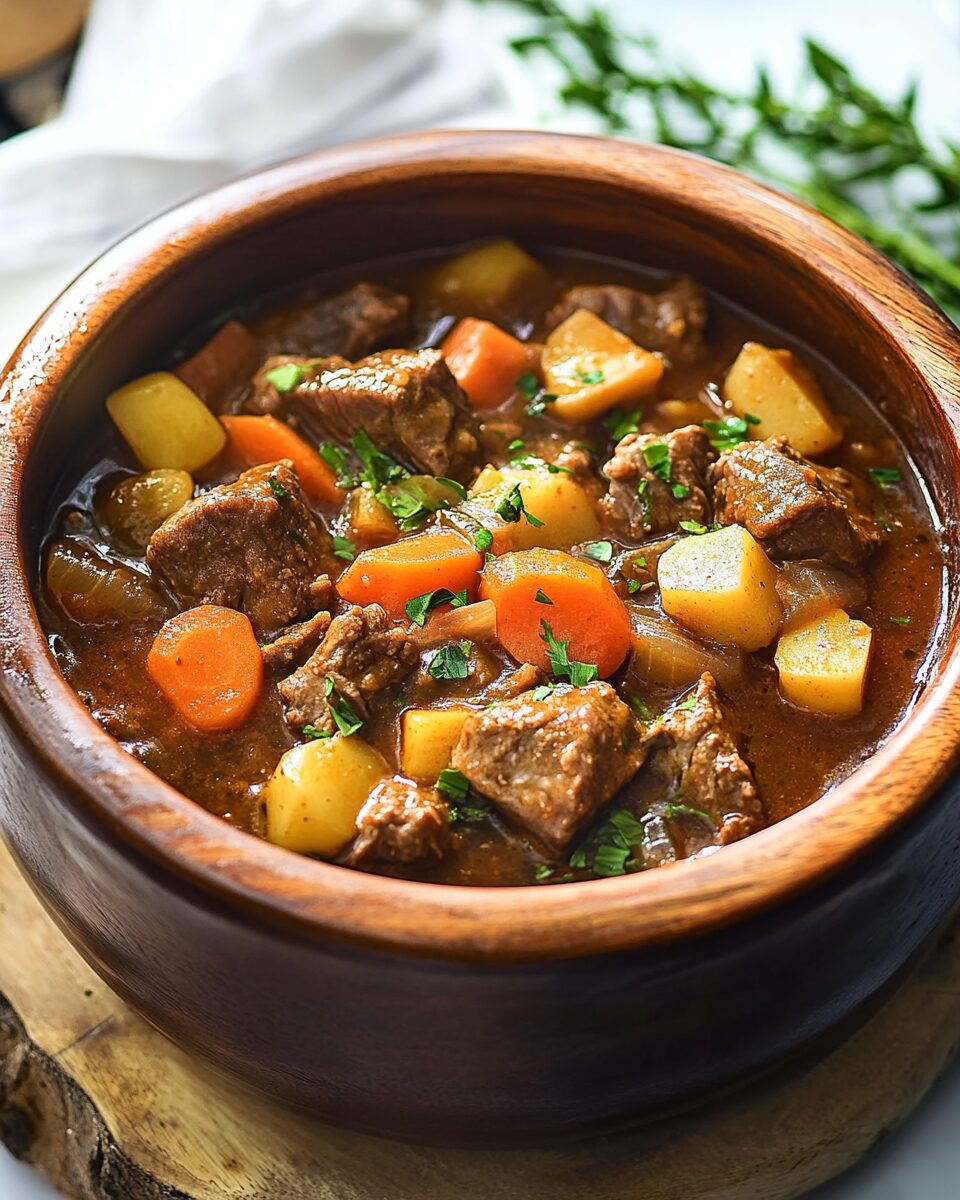Slow-Cooked Hearty Beef Stew: A Comforting Classic
There’s something incredibly comforting about a bowl of slow cooked beef stew. It’s a meal that warms you from the inside out, packed with rich, savory flavors, tender chunks of beef, and perfectly cooked vegetables. Whether you’re looking for a cozy family dinner, a make ahead meal for busy nights, or a dish that fills your home with an irresistible aroma, beef stew is a timeless favorite.
This classic dish has been around for centuries, with variations found in nearly every culture. From the French Boeuf Bourguignon to the Hungarian Goulash, stews have always been a staple for home cooks looking to make the most of simple ingredients. The slow cooking process transforms tougher cuts of beef into fork tender bites, while the broth develops into a deep, velvety gravy that coats every ingredient in flavor.
In this article, we’ll explore why crockpot beef stew is a must have in your meal rotation, some tips for making it even better, serving suggestions, and how to store and reheat leftovers for maximum flavor.
Why Slow-Cooked Beef Stew is the Ultimate Comfort Food
Beef stew has a unique way of bringing people together. It’s a dish that evokes memories of childhood, family dinners, and cozy winter evenings. But beyond nostalgia, there are a few key reasons why this dish is so beloved:
1. Deep, Rich Flavor
Cooking beef stew in a slow cooker allows all the ingredients to meld together, creating an incredibly deep, rich flavor. The beef absorbs the savory broth, while the vegetables take on the essence of the slow cooked meat, herbs, and spices. A splash of red wine, Worcestershire sauce, and a hint of maple syrup enhance the complexity of the gravy, making each spoonful taste like it’s been simmering for hours which it has!
2. Tender, Juicy Beef
One of the biggest challenges with cooking beef is achieving the perfect level of tenderness. Some cuts can become tough if not cooked properly, but using a slow cooker ensures that the meat becomes melt in your mouth tender. The long, slow cooking process breaks down connective tissue, making even budget friendly cuts of beef incredibly delicious.
3. Easy, Hands-Off Cooking
Life gets busy, and sometimes we just don’t have time to stand over a stove. That’s where a crockpot shines. Once you’ve browned the meat and prepped the veggies, everything goes into the slow cooker, and you can walk away for hours while it does the work for you. It’s the perfect meal for those who want a home cooked dinner without spending hours in the kitchen.
4. Budget-Friendly and Versatile
Beef stew is a great way to make the most of affordable ingredients. Since it uses tougher cuts of beef that benefit from slow cooking, you don’t need to splurge on premium cuts. Plus, you can easily adapt the recipe based on what you have on hand. Swap potatoes for sweet potatoes, add in extra root vegetables like parsnips, or throw in a handful of greens like spinach or kale for a nutritional boost.
Tips for the Best Slow-Cooked Beef Stew
While making beef stew is relatively simple, a few key tips can elevate it from good to absolutely amazing:
1. Brown the Meat First
Browning the beef before adding it to the slow cooker enhances the flavor significantly. It caramelizes the surface, creating a rich, deep taste that can’t be achieved by simply tossing raw meat into the crockpot. Take a few extra minutes to sear the meat your taste buds will thank you.
2. Don’t Skip the Wine (But You Can Substitute It)
Red wine adds a layer of depth to the stew that balances out the richness of the beef and broth. However, if you prefer not to cook with alcohol, you can replace it with extra beef broth or even a splash of balsamic vinegar for a similar effect.
3. Use the Right Type of Potatoes
Waxy potatoes, such as Yukon Gold or red potatoes, hold their shape well during slow cooking. Avoid starchy potatoes like russets, which tend to break down and make the stew too thick and mushy.
4. Layer Ingredients Properly
Always place the beef on the bottom of the slow cooker so it’s fully submerged in the liquid. This ensures even cooking and maximum tenderness. Vegetables should go on top so they cook at the right pace and don’t become overly soft.
5. Adjust the Thickness of the Gravy
If you prefer a thicker gravy, remove the lid for the last 10-15 minutes of cooking to allow excess moisture to evaporate. You can also mix a tablespoon of cornstarch with cold water and stir it into the stew before the final minutes of cooking.
6. Don’t Forget the Peas
Frozen peas should always be added at the very end to maintain their bright color and slightly crisp texture. If you add them too early, they’ll lose their vibrancy and become mushy.
Serving Suggestions
A hearty bowl of beef stew is satisfying on its own, but pairing it with the right side dishes can elevate the meal:
- Crusty Bread: A warm, crusty baguette or homemade dinner rolls are perfect for soaking up the delicious gravy.
- Mashed Potatoes: Serve the stew over creamy mashed potatoes for an extra layer of comfort.
- Rice or Egg Noodles: If you want a twist on the classic, ladle the stew over fluffy rice or buttered egg noodles.
- Side Salad: Balance out the richness with a light, refreshing green salad dressed in lemon vinaigrette.
Storage and Reheating Tips
One of the best things about beef stew is that it tastes even better the next day as the flavors continue to develop. Here’s how to store and reheat it properly:
Refrigerating Leftovers
Allow the stew to cool completely before transferring it to an airtight container. It can be stored in the refrigerator for up to 3 days.
Freezing for Later
Beef stew freezes beautifully. Let it cool completely, then portion it into freezer safe containers or resealable bags. Freeze for up to 3 months. Note that the texture of the potatoes may change slightly upon thawing, but the flavor will remain delicious.
Reheating Instructions
- Stovetop: Reheat on low heat, stirring occasionally, until warmed through. Add a splash of beef broth if needed to loosen up the gravy.
- Microwave: Heat in 1 minute intervals, stirring between each, until heated evenly.
- Slow Cooker: If you’ve frozen your stew, you can thaw it in the fridge overnight and reheat it in the slow cooker on low for a few hours.
Conclusion
Crockpot beef stew is more than just a meal it’s an experience. It’s the kind of dish that fills your home with a welcoming aroma, brings families together at the dinner table, and provides the ultimate comfort on a chilly day. With its rich flavors, tender beef, and hearty vegetables, it’s a timeless classic that never fails to satisfy.
Whether you’re preparing it for a casual weeknight dinner, a family gathering, or even meal prepping for the week ahead, beef stew is always a great choice. With the right techniques and a little patience, you can create a dish that tastes like it came straight from a gourmet kitchen without spending hours over the stove.
So, the next time you’re craving something warm and hearty, dust off your slow cooker and give this beef stew a try. You won’t regret it!






